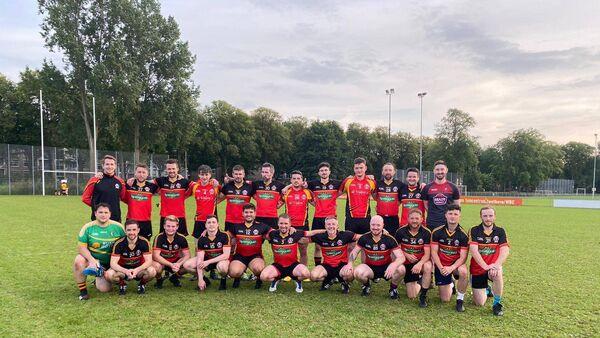People are usually surprised to hear how long it took for me to start enjoying rugby. I didn’t particularly like it until I played U16s. The privilege of being coached by Shannon legend Eddie Price played no small part in changing my attitude that season, but more than anything, it was the two-and-a-half stone I put on during the preceding summer holidays.
I was always hoping I would ‘fill out’ someday and thankfully, it happened in the middle of 2006. You see, prior to that, I was a bit of a rake. I was reasonably strong for a skinny fella and always had decent skills, but simple physics plays a bigger role in rugby than virtually any other team sport.
It’s a game that revolves around collisions, and in underage rugby especially, bigger lads rule the roost. The hormones, acne, and scoldings for being caught drinking in the local forest make being a teenager challenging enough, without also routinely getting sat on your arse by the big, bearded young men on the opposing team that you would give anything to be built like.
That year, the tables turned, and I was the one using my newly acquired rotundness to break tackles and cause damage. Before that, however, my focus was elsewhere.
I was lucky enough to play a lot of sport growing up. The GAA pitch in Carraig na bhFear was a five-minute drive from home; Rockmount AFC, where it all started for Roy Keane, was 15 minutes away. They were definitely my preferred sports until my rapid weight gain.
I was decent at GAA; effective, without ever lighting the place up. I was never going to achieve the equivalent of what I did in rugby, but I always enjoyed it.
And any time I went home to watch my old teammates line out for the Carraig Junior A side in the East Cork Championship, I would get a pang of regret that I never got the chance to play either sport as an adult.
I missed it, and always told myself I’d go back and play again when I retired, without every thinking it would happen. Then, all of a sudden, I was moving to Brussels, and needed to find a hobby that would let me make some pals.
When I stopped playing rugby, I had had surgery on my ankle (twice), my knee, my hip, both of my shoulders, and my pec. Throw a few injections in the lower back on top of that and you can probably understand why I wasn’t too keen to start scrummaging and running into lads again. So 12 years after my last game of football, I joined the ranks of Belgium GAA to make my not-so-glorious return to the sport.
My old teammate Barry O’Mahony, who now lives in the US, had encouraged me to do so, having had a great experience with the local hurling team when he arrived over there. He used to play in goal for tournaments, and tells a funny story about fresh-airing a puck out and the panic that ensued when he realised it meant the ball was now in play.
Joining the GAA club has been a fantastic decision. It’s a great illustration of the power of sport that an immigrant can arrive off the plane and immediately be accepted into a ready-made group of friends the way I have been.
It’s an eclectic mix, as you would expect in such a transient city. There are people from everywhere, doing anything and everything for a living.
The social element aside, I finally made my club debut a couple of weekends ago at a tournament in Den Haag. It was a great feeling to play competitive sport again, and as one of my teammates put it, ‘to play against someone else instead of the same f***ers we’ve been marking for the last year’.
What’s it like to make the switch back to football from a ‘foreign’ game after a 12-year break? Challenging, in a number of ways.
The first adjustment is getting to grips with marking a man. Aside from the hilarious amount of mouthing that goes on between lads as they move up and down the pitch (which I had no idea about), the stress marking someone places on your peripheral vision is notable. Rugby coaches will always encourage you to have your ‘head on a swivel’, to identify where the threat is, or to spot the opportunity to attack.
In rugby, you are pretty much always part of a horizontal line across the pitch, whether your team has the ball or not. Everything is happening in front of you, so regardless of how swivelly your head is, it won’t be turning more than 90 degrees, like sitting in the stand watching a rally of tennis.
Even a year into my return, I still find myself running around in circles trying to combine keeping an eye on the ball and an eye on someone making runs behind my back. I tend to resign myself to turning my back on the ball completely and treating him like a security guard in Tesco would treat a serial shoplifter, but I can’t imagine that approach features in the GAA best practice handbook.
Thankfully, I played in the full-forward line in my first match for Belgium GAA, so I didn’t have to do much defending and was usually running out to meet the ball. This is an adjustment in itself.
Obviously, when you get the rugby ball in your hands, the defence is directly in front of you. You have limited options, particularly as a forward. You will carry 80% of the time or more, potentially tip it on to the man next to you, or pass the ball out the back to a receiver if he’s calling for it.
In football, it’s far less defined. As a forward you are usually receiving your ball with your back to goal, meaning you’re completely blind to the place where you’re trying to score — the opposite to rugby. If you have come at pace to win possession, you have to put the brakes on hard, look for someone to move the ball to and try to turn to face the goal at pretty much the same time, usually with a man hanging off you and making life difficult.
It’s a lot to process and think about, and it gives you an appreciation for the instinct that top level players must have to turn their men and head for goal. Once again, I usually take the easy option and try to find a runner to offload to. One skill that is directly transferable is having fast hands, and being able to judge when to give the ball and where to put it in front of someone running at speed.
The level of contact is something I’ve struggled with. My default is obviously to hit with the shoulder to the chest and wrap, which is completely illegal. I find myself erring on the side of caution in an effort to get the balance right, meaning I often hold off too much, and give the man with the ball too much space and an opportunity to get outside me.
If someone tries to run a big arc around you in rugby, chances are they will get hit by someone else. In football, there is so much space that it’s difficult to track a guy down if you give him the initial opportunity to get away. In Den Haag I gave away a lot of frees by chasing the man and trying to whack the ball out of his hands, which invariably ended up with him on the floor. Again, not something that would make it into the coaching manual, I’m sure.
Another crucial skill is one that being a hooker couldn’t prepare you for any less — kicking scores.
The only time I kicked the ball in a professional game was in France, when I volleyed a knock-on down the field. I am almost afraid to try and kick points in training given how many embarrassingly awful efforts I’ve made in front of the posts.
When it comes to goals, I’m a bit better, but treat the ball like it contains pieces of gold and needs to be burst open with my foot, which leads to…varying degrees of accuracy, we’ll say.
Whoever the new Cork manager is, I doubt he’ll be giving me a call, but I’m certainly enjoying myself, so we’ll keep at it for another while yet.

